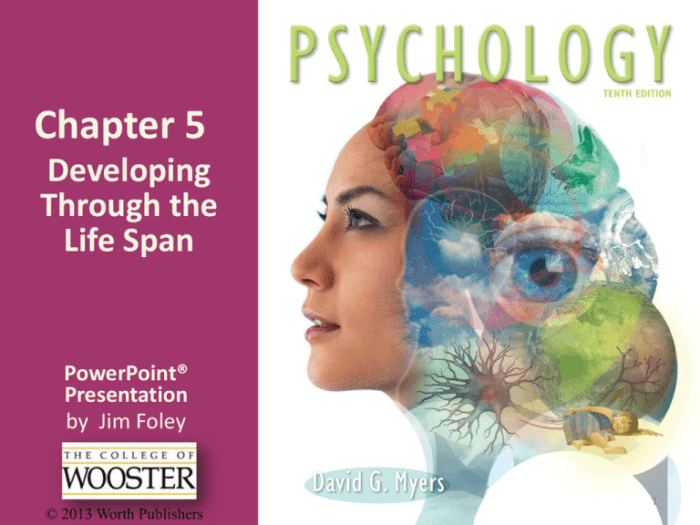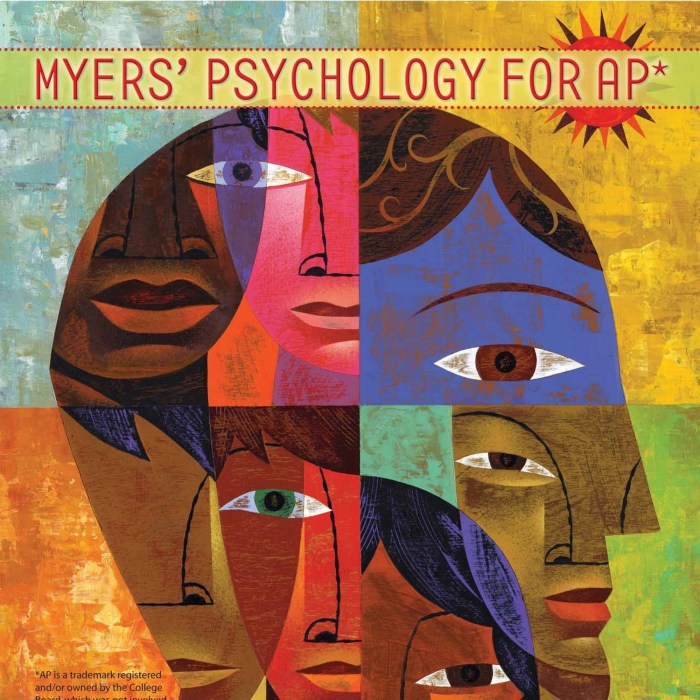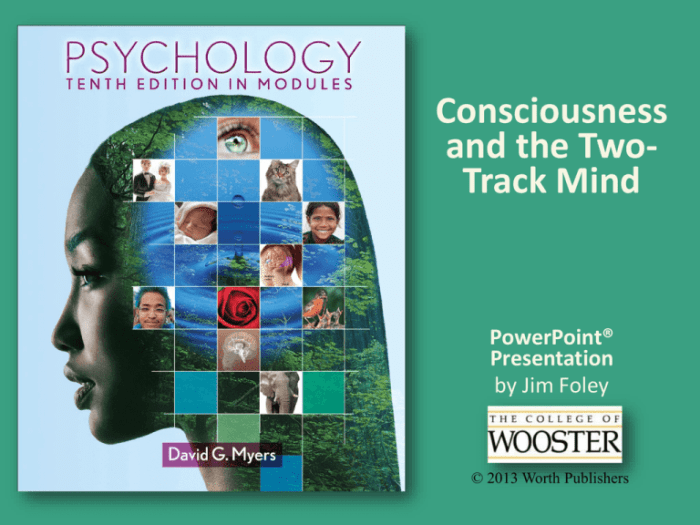David g myers psychology 10th edition – David G. Myers’ Psychology 10th Edition stands as a beacon of excellence in the field, offering an unparalleled exploration of the human mind and behavior. This comprehensive guide delves into the key concepts, applications, and pedagogical innovations that define this groundbreaking textbook.
Myers’ contributions to psychology as a discipline, his research interests, and his influential publications are meticulously examined, providing a deep understanding of his theoretical perspectives and the impact of his work.
David G. Myers and the Field of Psychology

David G. Myers is a renowned psychologist known for his significant contributions to the field of psychology. As an author, researcher, and educator, Myers has played a pivotal role in shaping our understanding of human behavior and the complexities of the human mind.
Throughout his career, Myers has conducted extensive research on a wide range of topics, including social psychology, personality, and the psychology of religion. His research has helped to advance our knowledge of human relationships, self-concept, and the factors that influence our beliefs and values.
Theoretical Perspectives
Myers’ theoretical perspectives are primarily rooted in social cognitive theory, which emphasizes the role of cognitive processes and social interactions in shaping behavior. He believes that our thoughts, beliefs, and attitudes interact with our social environment to influence our actions and experiences.
Influential Publications
Myers is widely recognized for his influential publications, including his best-selling textbook “Psychology” (now in its 10th edition). This comprehensive textbook has been used by millions of students worldwide and has helped to introduce countless individuals to the field of psychology.
In addition to his textbook, Myers has also authored numerous other books, including “The Pursuit of Happiness,” “Intuition: Its Powers and Perils,” and “Social Psychology.” These works have further expanded our understanding of human behavior and have been translated into multiple languages.
Key Concepts in Myers’ Psychology Textbook (10th Edition)

David G. Myers’ Psychology (10th Edition) provides a comprehensive overview of the field, emphasizing the importance of critical thinking, scientific research, and practical applications. The textbook is organized into seven parts, each focusing on a different aspect of psychology.
Myers presents psychological research and theories in a balanced and accessible manner, acknowledging both the strengths and limitations of different approaches. He also highlights the cultural and historical context of psychology, helping students understand how the field has evolved over time.
Fundamental Psychological Principles, David g myers psychology 10th edition
Several chapters in the textbook explore fundamental psychological principles, including:
- Theories of Learning:Chapter 5 discusses classical conditioning, operant conditioning, and social learning theory.
- Memory and Cognition:Chapters 6 and 7 cover topics such as memory processes, attention, language, and problem-solving.
- Motivation and Emotion:Chapter 8 explores the biological, psychological, and social factors that influence motivation and emotion.
- Development and Social Psychology:Chapters 11 and 12 discuss the cognitive, emotional, and social development of individuals, as well as the impact of social factors on behavior.
Applications of Psychology in Everyday Life
David G. Myers’ psychology textbook bridges the gap between theoretical concepts and practical applications, showcasing how psychological principles can illuminate and enhance various aspects of daily life.
From understanding our motivations and emotions to improving our relationships and decision-making, psychology provides invaluable insights into human behavior and experience.
Promoting Mental Health and Well-being
Psychology plays a crucial role in promoting mental health and well-being. By understanding the factors that contribute to mental health issues, such as stress, anxiety, and depression, psychologists can develop effective interventions and treatments.
Cognitive-behavioral therapy (CBT), for example, is a widely used approach that helps individuals identify and change negative thought patterns and behaviors that contribute to mental distress.
Critical Analysis of Myers’ Textbook
Myers’ textbook is widely regarded as a comprehensive and well-written resource for introductory psychology courses. It offers a comprehensive overview of the field, covering a wide range of topics from the history of psychology to the latest research findings. The textbook is also well-organized, with each chapter building upon the previous one in a logical and cohesive manner.
Additionally, Myers’ writing style is engaging and accessible, making the textbook easy to read and understand.
Accessibility
One of the strengths of Myers’ textbook is its accessibility. The textbook is written in a clear and concise style, making it easy for students to understand even complex concepts. Additionally, Myers uses a variety of pedagogical tools to help students learn, such as chapter summaries, key terms, and review questions.
These tools help students to retain information and to prepare for exams.
Comprehensiveness
Another strength of Myers’ textbook is its comprehensiveness. The textbook covers a wide range of topics in psychology, from the history of the field to the latest research findings. This makes the textbook a valuable resource for students who are interested in learning about all aspects of psychology.
Currency
Myers’ textbook is also up-to-date with the latest research findings in psychology. The textbook includes the latest research on a variety of topics, such as the role of genetics in behavior, the effects of social media on mental health, and the development of new treatments for mental disorders.
This makes the textbook a valuable resource for students who are interested in learning about the most recent advances in psychology.
Comparison to Other Textbooks
Myers’ textbook is one of the most popular introductory psychology textbooks on the market. It is often compared to other textbooks, such as those by Santrock, Cacioppo, and Zimbardo. Myers’ textbook is generally considered to be more comprehensive than other textbooks, and it is also more up-to-date with the latest research findings.
However, some students may find Myers’ textbook to be too dense or difficult to read.
Innovative Pedagogical Features in the Textbook
David G. Myers’ Psychology textbook incorporates innovative pedagogical features that enhance student learning, making the learning experience more engaging and effective. These features include interactive exercises, case studies, simulations, and a variety of multimedia resources.
The interactive exercises provide students with opportunities to apply their knowledge and skills in a practical setting. For example, the “Try It Out” exercises allow students to experiment with psychological concepts and observe the results firsthand. The “Check Your Understanding” quizzes help students assess their comprehension of the material and identify areas where they need further study.
Case Studies
The case studies present real-world examples of psychological phenomena, allowing students to see how psychological concepts apply to everyday life. For example, the case study of “The Stanford Prison Experiment” illustrates the powerful effects of social roles and situational factors on human behavior.
Simulations
The simulations provide students with immersive experiences that allow them to explore psychological concepts in a realistic setting. For example, the “Virtual Psychology Lab” simulations allow students to conduct psychological experiments and collect data, just as they would in a real-world laboratory setting.
Multimedia Resources
The textbook also includes a variety of multimedia resources, such as videos, animations, and interactive diagrams. These resources help to make the material more accessible and engaging for students. For example, the “Psych in Action” videos demonstrate how psychological concepts apply to real-world situations.
Ethical Considerations in Psychology: David G Myers Psychology 10th Edition

Myers’ textbook places a strong emphasis on the ethical principles and guidelines that govern psychological research and practice. He introduces the ethical principles established by the American Psychological Association (APA) and discusses their implications for researchers, clinicians, and students.Myers incorporates ethical considerations throughout his presentation of psychological research and theories.
He highlights the importance of informed consent, confidentiality, and the protection of participants from harm. He also discusses the ethical challenges that arise when conducting research on sensitive topics such as human sexuality and mental illness.
Ethical Dilemmas
Myers presents several ethical dilemmas that researchers and practitioners may encounter. For example, he discusses the ethical implications of using deception in research and the challenges of balancing the need for confidentiality with the legal obligation to report certain types of information, such as child abuse.Myers
also discusses the ethical issues that arise when psychologists work with clients from diverse cultural backgrounds. He emphasizes the importance of cultural sensitivity and the need to avoid imposing one’s own cultural values on clients.By incorporating ethical considerations into his textbook, Myers helps students to develop an understanding of the ethical principles that guide psychological research and practice.
He also provides them with the tools they need to make ethical decisions in their own work.
FAQ Overview
What are the key themes covered in Myers’ Psychology 10th Edition?
The textbook covers fundamental principles such as sensation and perception, learning, memory, cognition, motivation, emotion, personality, and social psychology.
How does Myers incorporate ethical considerations into his textbook?
Myers emphasizes the importance of ethical principles in psychological research and practice, providing guidelines and examples of ethical dilemmas.
What makes Myers’ textbook unique in terms of pedagogy?
The textbook employs interactive exercises, case studies, and simulations to enhance student engagement and facilitate a deeper understanding of psychological concepts.